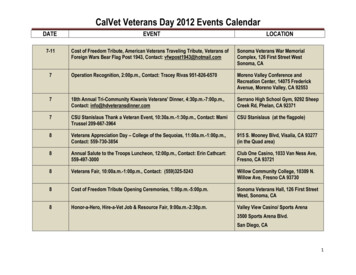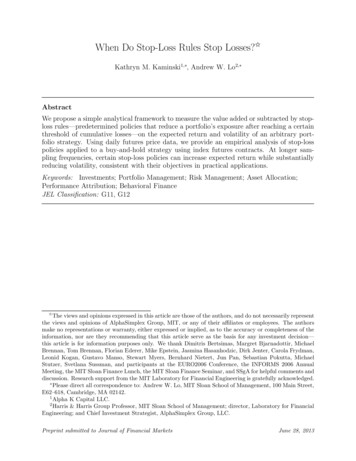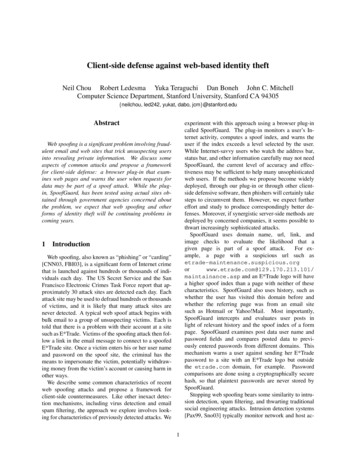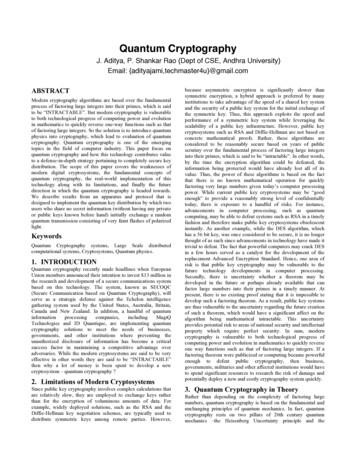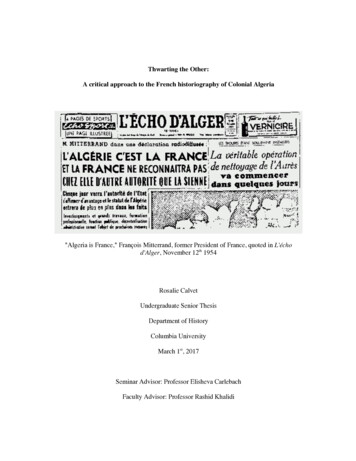
Transcription
Thwarting the Other:A critical approach to the French historiography of Colonial Algeria"Algeria is France," François Mitterrand, former President of France, quoted in L'échod'Alger, November 12th 1954Rosalie CalvetUndergraduate Senior ThesisDepartment of HistoryColumbia UniversityMarch 1st, 2017Seminar Advisor: Professor Elisheva CarlebachFaculty Advisor: Professor Rashid Khalidi
Calvet 2Table of ContentsAcknowledgmentsp. 3Introductionp. 4Chapter I.1) Collective-memory instead of French Historyp.13p.13i)ii)iii)On French memorial policies celebrating national unityHalbwachs and the invention of collective memoryNora and the theorization of memory-sites2) Tracing the history of the history of the War of Independencei)ii)iii)3) From Forgetting in Memory to Silence in History: Repressing the Unthinkablei)ii)iii)iii)p.23p.23A list of symptoms ignoring the causes of the silenceAlgeria to France: a colony or three departments?The Vth Republic or how the War gave birth to the institutions of contemporary France2) Unthinkable Independencei)ii)p.19Ricoeur: framing forgetting in collective memory in terms of the repressedTrouillot: pinpointing the unthinkable in historical productionUnfolding silence in French historiography: introducing thwarted historyChapter II.1) On silences in La Gangrène et l'Oublii)ii)iii)p.16Voicing out counter-memories: the role of Vichy and the War of Algeria1954-1992, the repression of history1992 to the present: Stora & La Gangrène et l'Oubli much ado about nothing?p.27On French colonial assimilationismAlgeria in French nationalismThe role of Algeria in the construction of the Resistancialist myth3) “The Invention of Decolonization”p.32i)Independence: an inevitable stage in the Tide of Historyii) Post-War historiography: decolonization as an achievementiii) The Fifth Republic or the marginalization of French AlgeriaChapter III.1) 1830-1962: Suppressing the Other from Historyi)ii)iii)Orientalizing the OtherDismissing the OtherSuppressing the Other2) 1962-1992: Ignoring “The Dividing Line of Historical Reason”i)The absence of post-colonial theories in French Academiaii)iii)Recognizing the elites, ignoring the massesLooking for the subject of History3) 1992 to the present: Thwarting the Other while re-burnishing colonial historyi)ii)iii)p.37p.37p.43p.48From colonial stigmas to discriminations against migrant communitiesThe political re-legitimization of colonial historyOn relations between French scholars and .59
Calvet 3AcknowledgmentsI came to this thesis inspired by a seminar about Orientalism and historiography I tookin the Spring of 2016 with Professor Rashid Khalidi. Pr. Khalidi was exceedingly generous inhis support as this project progressively became a senior thesis. Since September 2016, I havebeen incredibly fortunate to meet on a weekly basis with Professor Elisheva Carlebach, whomhelped me conceptualize the scope of this paper while consistently listening to my doubtsmonths after months. Pr. Carlebach and Khalidi’s confidence in my work, constant support andgenerosity have been critical. I am infinitely grateful for their advice, about this work, itsdestination and my own.At Columbia, I also found a critical support from the History, English and FrenchDepartments Faculty. Among my teachers, Allen Durgin, Joel Kaye, Yasmine Espert, CaterinaPizzigoni, Madeleine Dobie and Emmanuelle Saada taught me how to conceive and expressoriginal ideas with rigor, passion and humility. At the School of General Studies, Dean GlennNovarr significantly helped me maturing my thoughts.When I started this thesis, I was far from imagining that I would have the opportunityto meet in person the main scholars I was engaging with, and I would like to thank ProfessorStora and Professor Rousso for taking the time to answer my questions. I was expecting evenless that this project would take me out of the walls of the library, not only in New York, whereI had the incredible opportunity to meet with Professor Todd Shepard and with Professor TaNehisi Coates whom provided me with critical insights on French history, but also in Algiers,where Professor Mohammed El Korso and Professor Daho Djerbal helped me seeing historyfrom the Other side.
Calvet 4IntroductionL'Algérie c'est la France - "Algeria is France".— François Mitterrand1If some events cannot be accepted even as they occur, how can they be assessed later?— Michel-Rolph Trouillot2In 1830, the French soldiers of King Charles X invaded the coastal town of Algiers,following an argument between the Ottoman ruler of the city and the French consul. The Frencharmy took over seventy years to trace the borders of what we know today as Algeria, the biggestcountry in Africa, the Arab World and the Mediterranean basin, stretching from the sea to theconfines of the Sahara over 900,000 mi2 (see Figure 1). After seizing the littoral territoriescontrolled by the Sublime Porte, French troops moved inland and quelled local resistance whileexpanding their control towards the South. Whereas French history soberly remembers a"decrease" among the local populations during the conquest, foreign scholars refer to methodsreaching "genocidal proportions [.] leading to the death of at least 500,000 people."3As early as the beginning of the colonization, French and European settlers startedmoving to Algeria, constituting a population later called the pied-noirs.4 In 1848 Algeria wasdivided into three French departments and the local natives became "subjects" of the Frenchstate, deprived of their political rights, by contrast with the pied-noirs. Algeria was to remainFrench for one hundred and thirty-two years, to share each episode of its history, from theNapoleonic Empire to the two World Wars. As historian Marc Ferro argues: "elsewhere, therehad been invasions, occupations of countries that have lasted ten, twenty maybe thirty years.Yet, this level of occupation, with massive land dispossession and settlements is quitesingular:"5 Algeria was not only part of France, Algeria was France.61Allocution de Monsieur Mitterrand - Ina.fr,” INA - Jalons, accessed December 6, 2016Michel-Rolph Trouillot, Silencing the Past : Power and the Production of History (Boston, Mass: Beacon Press, 1995), 73.3Asafa Jalata, Phases of Terrorism in the Age of Globalization (Springer Verlag, 2016), 92–93.4In French pied-noirs means "black foot." This expression comes from Europeans wearing black-sole shoes. Europeanssettlers mainly came from France, Italy, Spain and Malta.5Marc Ferro, “La Colonisation Française : Une Histoire Inaudible,” La Découverte, Cahiers Libres 129 (2005).6Formula first used during the 100th "anniversary" of French Algeria in 1930. During the War of decolonization, futureFrench Prime minister re-used it in an interview to the newspaper L'Echo d'Alger: "l'Algérie c'est la France."2
Calvet 5In Algeria, French troops encountered much more complex populations then suggestedby the colonial labels "indigenous" or "Arabs."7 Modern Algeria belongs to the larger culturalunit of the Maghreb, the Western part of North Africa encompassing today Algeria, Moroccoand Tunisia, that features a history of its own since Antiquity (see map in Figure 2).8 Originallypopulated by the Berbers, North Africa was invaded by the Phoenicians around 800 BC, beforebeing incorporated into the Roman Empire in 200 BC. Christianized during the first and thesecond centuries, North Africa became a thriving province of the Roman Empire and the cradleof European Christianity.9 The Arab Conquest of the VIIth century led to the blending of Berberand Arab culture, the conversion to Islam and the fall of the Christian Church. Between theeight and the ninth century, a series of Muslim-Berbers dynasties ruled over the Maghreb,achieving its territorial and political unity. Most of the Maghreb, except for Morocco, passedunder Ottoman domination in 1553 and remained part of the Empire until the 19th century.During this period, the three political entities composing modern North Africa emerged. WhileTunisia and Morocco were to become protectorates of France, respectively in 1881 and 1912,Algeria was to be French for over a century.Aiming to justify the process of colonization itself, French historiography "objectified,rationalized and eventually inscribed the colonization of Algeria within the narrative of Frenchnation-building." 10 By contrast with the British colonial model of association, whichpragmatically preserved the pre-existing local power structures and did not interfere with thesocial organization of dominated territories, the French empire relied on the assimilationistmodel. French colonial administration taught the “subjects that, by adopting French languageand culture, they could eventually become French.”11 This logic was pushed to the extreme in7Peter Dunwoodie, Writing French Algeria (New York: Clarendon Press, 1998), 303.In this thesis we refer to the traditional meaning of the term Maghreb, however we must signal that in the 1950s emergedthe notion of a greater Maghreb encompassing Lybia and Mauritania.9Augustine was from North Africa. See: Lucien Oulahbib, Les Berbères et Le Christianisme, Editions Berberes, 2004, 5.10Nicolas Blancel, “L’histoire Difficile,” 2005, La Découverte, Cahiers Libres, n.d., 87.11“Assimilation (French Colonialism),” Wikipedia, January 29, 2017,https://en.wikipedia.org/w/index.php?title Assimilation (French colonialism)&oldid 762486714.8
Calvet 6Algeria, which was annexed to mainland France in 1848. The territory was divided into threedepartments directly controlled by the Minister of Domestic Affairs. Once “educated,”Algerians were to become proper citizens of the Republic.12 In the meantime, they were to abideby their status of “subjects” of the Empire as defined by the Code of Indigenous Status, althoughthe Senatus-Consulte of July 1865 ruled that those Algerians choosing to “renounce to theirstatus of Muslims” were eligible to receive political rights.13Instead of cementing the union between France and Algeria, the concept of citizenshipbecame progressively appealing to Algerians as a subversive tool to challenge French power.Political rights evolved from a criterion Algerians appeared to lack and against which they werecompared, to become the framework within which they could establish their claims. Algeriannationalism solidified at the turn of the 20th century. Originally a reformist movement led by asmall group of elites demanding the opportunity to prove that they could be Muslims and properFrench citizens, the movement became more radical after World War I, as France promised agreater autonomy to its colonies as a response to the enrolment of 173,000 Algerian soldiers inthe French army. Led by Messali Hadj, influenced both by Lenin's Third International andgrowing pan-Arab nationalism in the Middle East, the movement was institutionalized by thecreation of the Star of North Africa in 1926. Directed at the masses, the Star of North Africademanded independence. Within this context, Messali Hadj refused the 1936 governmentproposal to extend French citizenship with full political equality to certain classes of theMuslims, considering this plan as a new "instrument of colonialism [ ] to split the Algerianpeople by separating the elite from the masses."14 World War II was to interrupt the negotiationsbetween Algerian leaders and the French government.As in World War I, Algerians first rallied to the French government and were enrolledin the army in large numbers during the Second World War. History textbooks and public12Jules Ferry, “Discours Sur La Colonisation,” July 1885.“Indigénat,” Wikipedia, January 5, 2017, https://en.wikipedia.org/w/index.php?title Indig%C3%A9nat&oldid 758373443.14Messali Hadj, Les Mémoires de Messali Hadj, 1898-1938 (Paris: JC Lattès, c1982), 28.13
Calvet 7ceremonies often understate the major role of North African troops in the liberation of mainlandFrance itself. Most of the “French” troops who landed in Provence in 1944 were Algerian,Moroccan and Senegalese.15 After Nazi Germany's quick defeat of France and the subsequentestablishment of the collaborationist Vichy regime, Charles de Gaulle made Algeria and thecolonies the core of the Resistance. The Allies invaded the French territories in North Africa inNovember 1942 (see Figure 3 for a map of this operation), from where they organized theliberation of Southern Europe. The local governments hitherto aligned with the Vichy regimereacted differently to the operation. In Morocco, the Vichy troops surrendered after three daysof fighting while in Tunisia the soldiers of the Axis powers were not defeated until May 1943.In Algeria, French Resistance helped the Allies to overthrow Vichy officials, and soon Algiersbecame the centre of De Gaulle's Free France.16On the 3rd of June 1944, as the liberation of mainland France had become certain,Charles de Gaulle established the Provisional Government of the French Republic, the interimgovernment of Free France, with Algiers as its capital. Reflecting on World War II in hisMemoirs, De Gaulle claimed: "the Republic never died, it survived within Free France [.] inAlgiers."17 This narrative, named the resistancialist myth by historian Henry Rousso, nullifiedthe legitimacy of the Vichy regime and thus negated the collaboration with Nazi Germany:France had resisted the enemy within herself, namely, in Algeria. As analysed by Rousso in LeSyndrome de Vichy, a work published in 1987, post-World War II France was built on thenegation of the collaboration and the crimes of the Vichy regime. However, the War of Algeriaof Independence, which started in 1954, was to excavate the repressed memory of Vichy.15Éric Deroo and Antoine Champeaux, “Panorama des troupes coloniales françaises dans les deux guerres mondiales,” trans.Robert A. Doughty, Revue historique des armées, no. 271 (July 3, 2013): 72–88.16For more information on the role of Algeria in the resistance see Jacques Cantier, L’Algérie Sous Le Régime de Vichy(Paris: O. Jacob, c2002).17Charles de Gaulle, Mémoires (Paris: Gallimard, 2000), xi.
Calvet 8In the aftermath of World War II, the Algerian nationalist movement was brutallyquelled by the French political power. In May 1945, as a response to pro-independencedemonstrations, the French Army murdered over 20,000 Algerians. 18 Messali Hadj wasimprisoned, and the nationalist political parties prohibited. Yet this brutal repression did notsuppress pro-independence claims - on the contrary, they became more radical. In October1954, five young Algerians created the National Front of Liberation (NFL), which became theleading nationalist organization, and was to rule Algeria after 1962. On November 1st, the NFLbroadcasted a manifesto on the radio calling for the "immediate independence" of Algeria,thereby launching a war that was to last eight years, kill over half a million of people, overthrowthe IVth Republic in France and eventually create an independent single-party country Algeria.19The degree of violence during the War of Algeria was such that the French army wascompared, as the conflict was happening, to the SS troops of Nazi Germany by dissentingjournalists.20 Tortures, rapes and massacres were the daily reality of the War, both in Algeria,where the NFL and the French army wrecked thousands of civilians, and in mainland France,where the French police massacred Algerian workers and pro-independent Frenchdemonstrators.21 Yet the War did not only oppose the NFL to the French army, it also dividedboth French and Algerians. On the Algerian side, two rival organizations claimed leadership ofthe nationalist movement: the NFL and the National Algerian Movement (MNA). Moreover,some Algerians chose to fight for the French army. These soldiers, called the harkis, weremurdered in great numbers by the NFL and abandoned by France after independence. 22 On theother side, the pied-noirs had been hostile to the government since the beginning of the War,18Yves BENOT and François MASPERO, Massacres coloniaux (La Découverte, 2013).Secrétariat général du Front de libération nationale, Appel au peuple algérien, 1954.20For a synthesis on the question see James D. Le Sueur, Uncivil War : Intellectuals and Identity Politics during theDecolonization of Algeria (Lincoln: University of Nebraska Press, c2005); and for a testimony of an activist during the WarGermaine Tillion, France and Algeria: Complementary Enemies (Westport, Conn: Greenwood Press, 1976).21Éditions Larousse, “Encyclopédie Larousse En Ligne - L’affaire Du Métro Charonne,” accessed April 3, ffaire du métro Charonne/186074.22For more informations on the harkis, see Claude Lanzmann (dir.) (Les Temps modernes), Harkis, 1962-2012 : Les Mytheset les Faits, Paris, Gallimard, novembre-décembre 2011, 315 p.19
Calvet 9judging it to be too compromising towards the NFL. In May 1958, a coalition of Generalsattempted a putsch in Algiers, denouncing the abandonment of Algeria and calling for DeGaulle to become President. De Gaulle, who had retired from politics in 1946, accepted oncondition that a new Constitution reinforcing the executive power be introduced and that he bevested with extraordinary powers for six months. The government of the IVth Republic yielded,and in September 1958, the Constitution of the Vth Republic was adopted by a popularreferendum vote of 79%. However, as the conflict continued, independence seemed more andmore inevitable, and De Gaulle started leaning towards such a solution. Betrayed by the onesupposed to support them, the partisans of French Algeria replied by the creation of a terroristgroup, the OAS, in French l'Organisation de l'Armée Secrète. This group, which continued tooppose the government after the independence, gave birth to the extreme-right political partyLe Front National.During the entire conflict, the War was never named as such: to acknowledge it wouldhave been equivalent to admitting the dislocation of the Republic. Censorship prevented thepublication of hundreds of books and dozens of movies testifying to the very details of theconflict. For contemporary observers, "Algeria [was] and must remain[ed] French; no moreFrench Algeria, no more France."23 As impossible as it might have seemed, the Independenceyet put an end to the War. After signing a ceasefire with the NFL on the 18th of March 1962,the French government held an independence referendum in Algeria on the 1st of July, whichwas approved with 99.72%. One million pied-noirs were repatriated to France, which had justlost the last territory of its Empire, or more precisely, half of itself.After the end of the conflict, the French State continued to deny the very occurrence ofthe War per se. In official texts, it was described instead via a variety of euphemisms, such as“les événements d’Algérie” or “the events of Algeria.” Such a denial had a particular impact on23Stora, La Gangrène., 17.
Calvet 10society, as in France the Minister of Education sets high school programmes and monitors thecontent of history textbook while the Minister of Scientific Research has the monopoly uponthe funding of academic works. This implies that for over thirty years, the War was barelydiscussed within academia, media and political debates. Meanwhile, conflicting memories ofthe War survived through different groups of individuals: the former soldiers of the Frencharmy, the pied-noirs but also the harkis repatriated to France, and the Algerian diaspora inFrance.In 1992 historian Benjamin Stora published La Gangrène et l'Oubli, a book about theerasure of the War of Algeria of Independence from French historiography. Through extensivearchival research, Stora excavated the darkest hours of the War while pinpointing how since1962 the State had used censorship to deny the very occurrence of the War. Stora furtheranalysed the legacy of the War on French and Algerian politics and relations between the twocountries. The most renowned French scholar of the history of Algeria, Stora has become thepresident of the Museum of Immigration in Paris and intervenes frequently in the public sphereto denounce the abuses of memory surrounding the War of Algeria.After the 1990s, the government adopted a series of memorial laws and policies framingthe remembrance of the War. The peculiar practice of the French State to pass laws defining anofficial version of history intensified during the 1990s. In 1999 the deputies of the FrenchNational Assembly voted to replace the "events of Algeria" by the "War of Algeria" in the legaldocuments of the French Republic, eventually naming the War as such, over 35 years after itsbeginning.24 In 2005 a law boasting the "positive aspects of colonization" failed to be adoptedat the Deputy Chamber, while in 2012 a law recognizing "the civilian and the military victimsof the War of Algeria" was voted.25 This brief overview of French legislations regarding the24Éditions Larousse, “Encyclopédie Larousse En Ligne - L’affaire Du Métro Charonne,” accessed April 3, ffaire du métro Charonne/186074.25“Loi portant reconnaissance de la Nation et contribution nationale en faveur des Français rapatriés,” Wikipédia, January 19,2017,
Calvet 11memory of the War exhibits how the memory of this conflict remains a sensitive issue incontemporary France. At this very time, French candidates for the 2017 presidential electionsare debating whether French colonization and the War in Algeria should be classified as crimesagainst humanity.26Not only does the memory of the War remain a conflicted one on the political level, butscholars themselves also seem hesitant to adopt one or another account of the conflict. Engagedin a radio discussion with Stora in May 2016, French journalist François d'Orcival argued:We fail to come to an agreement on the memory of the War of Algeria as it remainsvivid in the minds of those who experienced it in a way or another. This oppositionwithin ourselves, the national body of the French community, is a kind of mystery ofthe end of colonization that we still have not fully processed.27Despite being the greatest specialist of the War, Stora agreed with François d'Orcival about thefact that there is still in France a "mystery" about the memory of independence of Algeria,which this thesis hopes to unfold.***“The War of Algeria gave birth to modern France:” it created its contemporary regime,the Fifth Republic, shaped its current political parties and dramatically impacted thedemographic evolution of the country. 28 To investigate why such a fundamental episode ofFrench history remains so controversial, and even ‘mysterious’ in the mouth of prominentscholars, this paper dissects the historical narratives of the War. Focusing on the work of Storaas a case illuminating the mainstream trends of French academia, this work offers a criticalhttps://fr.wikipedia.org/w/index.php?title Loi portant reconnaissance de la Nation et contribution nationale en faveurdes Fran%C3%A7ais rapatri%C3%A9s&oldid 133786812; “Loi du 6 décembre 2012 relative à la reconnaissance du 19mars comme journée nationale du souvenir et de recueillement à la mémoire des victimes civiles et militaires de la guerred’Algérie et des combats en Tunisie et au Maroc - Panorama des lois - Actualités - Vie-publique.fr,” text, (December 7,2012), algerie-combats-tunisie-aumaroc.html.26“« Oui, la colonisation est un crime contre l’humanité »,” Le Monde.fr, February 17, nite 5081481 3212.html.27Finkielkraut Alain, Benjamin Stora, and François D’Orcival, “La Mémoire de La Guerre d’Algérie,” Répliques (Paris, May2016), sec. 2:00.28Ibid.
Calvet 12approach to how the events were narrated, rather than an account of the events themselves.Within this framework, secondary sources become primary ones, to distinguish what happenedfrom that is said to have happened. In the perspective of historian Michel-Rolph Trouillot,whom defined historical production as comprised of fact creation, assembly and fact retrieval,or the making of narratives, this thesis dissects the roots of the silences in the narratives of theWar of Algeria. Assuming with Trouillot that any “historical narrative is a particular bundle ofsilences,” the eventual aim of this work is to pinpoint what structures of power do silencesmanifest. 29 The first chapter highlights the limits of the conventional historiography of the Warwhich relies on the notion of forgetting in collective memory. It argues in favour of analternative approach to the conflict, defined as thwarted history, which requires historians toacknowledge the failure of historical narratives to name certain events. The second chapteranalyses what remains unthought-of about the War and what made the independence Algerianunthinkable. The third chapter lays down some elements to construct an alternative, andeventually reconciliatory, approach to French Algerian history, by focusing on who is absentfrom historical narratives.29Michel-Rolph Trouillot, Silencing the Past : Power and the Production of History (Boston, Mass: Beacon Press, 1995) 69.
Calvet 13Chapter ICollective memory is a French invention. You know this, right?30—Elisheva CarlebachIn France, collective memory is rooted in those internal crises one could consider civil Wars: Vichy,Algeria 31—Henry Rousso, Le Syndrome de VichyForgetting [.] remains the disturbing threat that lurks in the background of the phenomenology ofmemory and of the epistemology of history.32— Paul RicœurHow does one write the history of the impossible?33— Michel-Rolph TrouillotThis chapter hopes to demonstrate the specificities of the writing of the War of Algeriain France while highlighting the impact of post-World War II French historiography upon it.Introducing the singular role of collective memory in French history (1), the followingparagraphs provide an overview of the evolution of the French historiography of the War ofAlgeria (2) before discussing the limits of French scholars' methodology and to argue in favourof an alternative approach by introducing the concept of thwarted history (3).1. Collective-memory instead of French HistoryIn France, ever since the emergence of the State during the feudal period,34 politicalinstitutions have continuously produced norms and symbols framing the collective memory ofhistory in order to legitimize the narrative of French national unity.35 Although such a practice30Elisheva Carlebach, Senior Thesis Discussion, October 18, 2016.Henry Rousso, The Vichy Syndrome: History and Memory in France since 1944, trans. Arthur Goldhammer, Revisededition (Harvard University Press, 1994).32Paul Ricœur, Memory, History, Forgetting (Chicago: University of Chicago Press, 2004), 285.33Michel-Rolph Trouillot, Silencing the Past : Power and the Production of History (Boston, Mass: Beacon Press, 1995), 69.34Usually dated by historians as beginning in the IXth century, for more information on this question see François LouisGanshof, Qu'est-ce que la féodalité ?, Germaine Tillion, France and Algeria: Complementary Enemies (Westport, Conn:Greenwood Press, 1976); James D. Le Sueur, Uncivil War : Intellectuals and Identity Politics during the Decolonization ofAlgeria (Lincoln: University of Nebraska Press, c2005)., Tallandier, 1998, 296 p.35Johann Michel, Gouverner Les Mémoires : Les Politiques Mémorielles En France (Paris: Presses universitaires de France,2010), 20.31
Calvet 14has often accompanied the development of nation-states in Western Europe and throughout theworld, 36 political scientist Johann Michel underlines the singular historical trajectory of theFrench state, which for centuries has had a "monopoly" over collective memory. Indeed,through laws, architecture and celebrations, the State has implemented memorial policiesregarding French history. According to Michel, this explains the long-lasting confusion inFrench historiography between the production of memory and the writing of history. 37 Fordecades, the State imposed cognitive frameworks limiting historians' ability to challenge theofficial public memory.38Published in 1925, The Social Frameworks of Collective Memory by French philosopherand sociologist Maurice Halbwachs theorized the concept of collective memory. In Halbwach'sperspective, collective memory is not the sum of individual memories, but the frameworkthrough which "present generations become conscious of themselves by counter-posing theirpresent to their own constructed past."39 Because it is defined as the specific ways in which agiven social group interprets its past, collective memory enables historical continuity. Socialgroups reconstruct their history when "imaginatively re-enacting" the past by participating incommemorative collective activities. 40 The nature of these commemorations is shaped bypresent-anchored concerns and reflects how the past is "stored and interpreted by socialinstitutions."41Concerning the evolution of 20th century French academic conversation on history andmemory, the significance of Halbwachs' work is threefold. First, Halbwachs' identification ofcollective memory is not only an analytical breakthrough following the blueprint laid out bysociologists and historians such as Durkheim, Mark Bloch and Lucien Febvre on social36Tilly, Ardant, and Social Science Research Council, The Formation of National States in Western Europe.Michel, Gouverner Les Mémoires, 358.38Michel, Gouverner Les Mémoires, 359.39Maurice Halbwachs, On Collective Memory (The University of Chicago Press, 1992), 28.40Halbwac
French Prime minister re-used it in an interview to the newspaper L'Echo d'Alger: "l'Algérie c'est la France." Calvet 5 In Algeria, French troops encountered much more complex populations then suggested by the colonial labels "indigenous" or "Arabs."7 Modern Algeria belongs to the larger cultural




